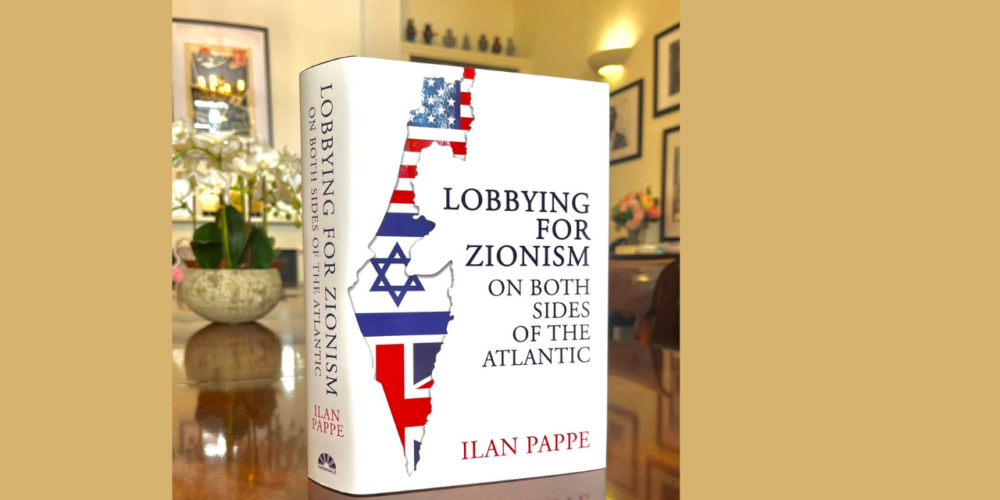Ilan Pappé, as readers may know, is one of the most controversial of Israel’s “new historians” after having sacrificed his academic career there by publishing extensively on the buried history of the Nakba and challenging official Zionist accounts of the colonisation of Palestine. His most recent work, Lobbying for Zionism on Both Sides of the Atlantic, is a history of what Pappé terms “The most successful advertising campaign in history”: namely, the efforts to promote the idea of a Jewish state in the Middle East in Britain and America in the decades leading up to the establishment of Israel, and defending its worst excesses ever since.
Pappé takes a broad approach to how he defines the Zionist lobby, allowing for the inclusion of religiously motivated Christian Zionists alongside philosemites such as David Lloyd George and imperialist antisemites like Arthur Balfour in his account of how Zionism came to influence British and American thinking on the Middle East. The concerns of Palestinians and non-Zionist Jewish people never weighed on the minds of Zionist leaders such as Theodore Herzl, who saw their mission as fitting into 19th century colonial projects to bring enlightenment to the natives, or those within British and American governments who came to support the creation of the state of Israel. This was not without misgivings towards Israeli conduct (even such figures as Margaret Thatcher or George Bush Sr were willing to publicly criticise and even sanction Israel to a degree that is unimaginable now). However, as Pappé traces here, the Zionist lobby has effectively captured the institutional imagination and enabled the state of Israel to dictate how mainstream politicians are allowed to talk about the issue, regardless of the facts on the ground or public opinion.
Over the course of 150 years, this effort from Zionist activists and their heirs in the Israeli government has succeeded, through a combination of financial donations and intimidation of anyone brave enough to voice concern for the welfare of Arabs, in making support for Israel an article of faith in mainstream British and American politics. One need only look at the treatment of Jeremy Corbyn by the British political and media establishment, particularly within the Labour Party itself, for advocating a two-state solution, to see how effective this lobby has become. More dangerously yet, one estimate cited that 80% of the weapons used to destroy Gaza came from Britain, America or Germany (the other great success story of the Zionist lobby, should Pappé feel emboldened to write a follow-up volume). Israel is not only protected from any consequences of its actions by having lobbied so effectively, it’s how they can carry these atrocities out in the first place.
What’s revealing is that the movements profiled here concentrated on lobbying elites and prominent institutions to curry favour for Zionism, be they 19th century British Prime Ministers, universities or contemporary US political and business leaders. Zionists have rarely sought to build a broad mass movement to force political action or oppose existing antisemitism, even amongst oppressed Jewish communities in prewar Europe or America.
By contrast, pro-Palestine activism in the West has been based on developing bottom-up solidarity by educating the public from within trade unions, political parties, Arab communities and those in the Jewish diaspora horrified by the violence being carried out in their name. This difference in organising tactics may account for the age disparities in support for Israel or Palestine in the immediate aftermath of October 7th (a Pew Research study published in March 2024 found that 53% of Americans surveyed who were over the age of 65 thought that Israel’s conduct towards Gaza was justified, as opposed to 21% of those under 30), but does leave the anti-Zionist movement with a major challenge. Despite their major successes in educating the wider public as to the extent of Israeli genocide and the complicity of Western governments and corporations, the Zionist lobby still has far more influence with decision-makers.
Indeed, even in Ireland, the “most pro-Palestine country in Europe”, recent decisions such as recognising the state of Palestine only came after decades of sustained pressure and huge public outcry. These have not been accompanied by sanctions at time of writing. Could even these concessions have been won at all if the Zionist lobby was not marginal in Ireland?
The pro-Palestine movement has never been more prominent in the West, but Western governments and corporations are still committed to the success of the Zionist project. What this book tells us is that solidarity with Palestine is not only a case of being anticolonial and antiracist, but also of preserving a democratic society and confronting powerful vested interests in an era when the political class have never been more out of touch with public opinion on the issue.
Lobbying for Zionism on Both Sides of the Atlantic is available from Connolly Books.






